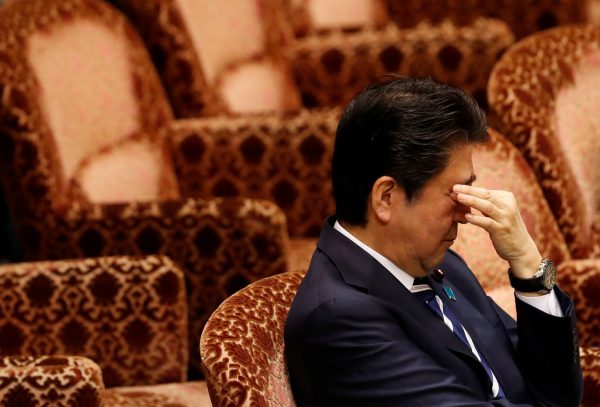The scandal engulfing the Abe administration raises questions about the conduct of Japan’s politics and administration under the current government.
During parliamentary sessions, Abe’s responses to opposition comments and questioning about the scandal have ranged from rapid-fire denials of any connection with, knowledge of, or responsibility for the affair to apparent slumber during discussions of the issue. This behaviour raises doubts about the sincerity of his latest round of apologies for the scandal, even though he has taken extra care not to show his usual arrogance.
There is also the question of ministerial responsibility. Not only is Finance Minister Taro Aso refusing to take responsibility for the conduct of bureaucrats in the Ministry of Finance (MOF) who falsified documents and heavily discounted the land price, but he has distanced himself from the affair by blame-shifting on to ministry officials while promising to investigate bureaucrats’ activities and ensure that they did not recur.
The broader implications of such a stance is that neither the Prime Minister nor the Finance Minister should be held accountable for the scandal.
Moreover, the Prime Minister and Finance Minister have failed to acknowledge the contents of deleted material in tampered MOF documents relating to the land deal, which named several Liberal Democratic Party (LDP) politicians and the Prime Minister’s wife, Akie Abe (including her comments on the deal). The deleted material also referred to the ‘special nature’ of the land sale to Morimoto Gakuen. Abe and Aso have adopted a strategy of plausible deniability by disavowing any role in the actual document tampering, rather than focussing on the bigger question of why the school received special treatment from the Ministry.
Given the parallels with another serious school-related scandal involving a similar favour for a friend of Abe and the existence of government documents referring to ‘the prime minister’s intent’ in that case, it is difficult to believe that no political influence was exerted either directly or indirectly regarding Morimoto Gakuen. A widely held view is that the problem was caused by MOF bureaucrats trying to surmise what the Prime Minister would want given Abe and his wife’s close relationship with Moritomo Gakuen’s director, Yasunori Kagoike. Moreover, the Ministry of Economy, Trade and Industry sent two officials to work as secretaries to Akie Abe, one of whom is suspected to have been acting as an intermediary with the school.
At the very least, Abe and Aso are open to the charge that they established an environment that encouraged MOF officials to grant discretionary favours on their bosses’ behalf. As such, the Prime Minister and Finance Minister share responsibility for the outcome. To pass all the blame on to administrative subordinates is mere scapegoating. The general Westminster principle of parliamentary cabinet governments is that those at the top should carry responsibility for the organisation and government they lead.
Another powerful institutional factor at work is the Abe administration’s politicisation of the top echelons of the bureaucracy through the Cabinet Bureau of Personnel Affairs, which was established in May 2014. The significance of the bureau is that it institutionalised a process whereby the Prime Minister’s office (the Kantei) makes all major personnel decisions in the bureaucracy. There are reports that bureaucrats are increasingly concerned about not challenging the Kantei, and that public servants now prioritise saving their necks, being promoted and brown-nosing the people in power for that purpose. In April 2017, Japan’s Nikkei pointed to concern that the Kantei’s control over appointments in the ministries would lead to bureaucrats ‘excessively surmising the Kantei’s intentions’. Other commentary has attributed the scandal to the ‘Abe Administration’s “excessive political leadership”’.
The big question is: will Abe’s boat rock enough for him to fall out?
Much of the Moritomo scandal has yet to play out. Unless the government can cap it quickly, it may further destabilise the administration and Abe’s plans for constitutional reform. It could strengthen an invigorated opposition and the Diet’s authority, energise LDP factional machinations and prompt independent investigatory moves in the LDP. All of this could damage Abe’s prospects in the September 2018 LDP leadership election.
Aso’s immediate fate is also crucial. He plays a pivotal role as Abe’s henchman by showing unswerving loyalty and support for the prime minister and bringing his large faction in behind him. Losing him would be a catastrophe for Abe, who relies on the Deputy Prime Minister and Chief Cabinet Secretary Yoshihide Suga as core executives in the Kantei. But the Ministry of Finance will want to argue that the official at the frontline was forced to accept the Kantei’s wishes. The Ministry has continually bristled at the concentration of power in the Kantei and is trying to defend its traditional powers and policy positions against the Abenomics ‘arrow’ of fiscal stimulus and delays in the consumption tax increase.
While Abe is not known as the ‘Teflon prime minister’ for nothing, two factors are critical in determining his fate: trends in public support rates for the cabinet and the kind of opposition emerging within the LDP to Abe’s prime ministership. Will the anti-Abe forces use the Moritomo scandal to galvanise themselves into action?
Aurelia George Mulgan is a Professor in the School of Humanities and Social Sciences at the University of New South Wales, Canberra.


As a Japanese voter who does not support the LDP, I consider the Moritomo issue an utter waste of time and energy. More important, it keeps political debate focused on trivia when issues such as the provocative and wasteful procurement of F35 aircraft and their probable deployment on an aircraft carrier are being ignored.
Even if it leads to Abe losing the support of the LDP, the government will still be LDP and at least one of the probable replacements is much more of a hawk than Abe.
I suppose in the absence of a Japanese Stormy Daniels, the opposition feels obliged to go with whatever dirt it can dig up but in the grand scheme of things Moritomo is hardly a matter of any real significance.